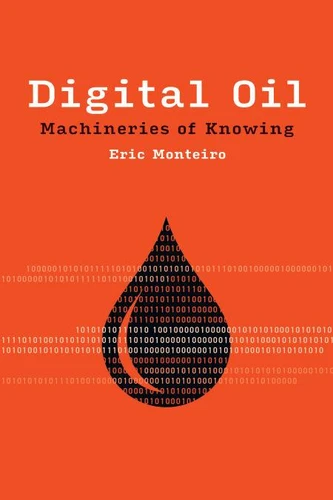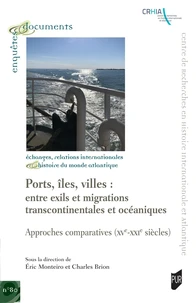Digital Oil. Machineries of Knowing
Par :Formats :
Disponible dans votre compte client Decitre ou Furet du Nord dès validation de votre commande. Le format ePub protégé est :
- Compatible avec une lecture sur My Vivlio (smartphone, tablette, ordinateur)
- Compatible avec une lecture sur liseuses Vivlio
- Pour les liseuses autres que Vivlio, vous devez utiliser le logiciel Adobe Digital Edition. Non compatible avec la lecture sur les liseuses Kindle, Remarkable et Sony
- Non compatible avec un achat hors France métropolitaine
 , qui est-ce ?
, qui est-ce ?Notre partenaire de plateforme de lecture numérique où vous retrouverez l'ensemble de vos ebooks gratuitement
Pour en savoir plus sur nos ebooks, consultez notre aide en ligne ici
- Nombre de pages216
- FormatePub
- ISBN978-0-262-37229-9
- EAN9780262372299
- Date de parution08/11/2022
- Protection num.Adobe DRM
- Taille27 Mo
- Infos supplémentairesepub
- ÉditeurThe MIT Press
Résumé
How is digitalization of the offshore oil industry fundamentally changing how we understand work and ways of knowing?Digitalization sits at the forefront of public and academic conversation today, calling into question how we work and how we know. In Digital Oil, Eric Monteiro uses the Norwegian offshore oil and gas industry as a lens to investigate the effects of digitalization on embodied labor, and in doing so shows how our use of new digital technology transforms work and knowing. For years, roughnecks have performed the dangerous and unwieldy work of extracting the oil that lies three miles below the seabed along the Norwegian Continental Shelf.
Today, the Norwegian oil industry is largely digital, operated by sensors and driven by data. Digital representations of physical processes inform work practices and decision-making with remotely operated, unmanned deep-sea facilities. Drawing on two decades of in-depth interviews, observations, news clips, and studies of this industry, Eric Monteiro dismantles the divide between the virtual and the physical in Digital Oil. What is gained or lost when objects and processes become algorithmic phenomena with the digital inferred from the physical? How can data-driven work practices and operational decision-making approximate qualitative interpretation, professional judgement, and evaluation? How are emergent digital platforms and infrastructures, as machineries of knowing, enabling digitalization? In answering these questions Monteiro offers a novel analysis of digitalization as an effort to press the limits of quantification of the qualitative.
Today, the Norwegian oil industry is largely digital, operated by sensors and driven by data. Digital representations of physical processes inform work practices and decision-making with remotely operated, unmanned deep-sea facilities. Drawing on two decades of in-depth interviews, observations, news clips, and studies of this industry, Eric Monteiro dismantles the divide between the virtual and the physical in Digital Oil. What is gained or lost when objects and processes become algorithmic phenomena with the digital inferred from the physical? How can data-driven work practices and operational decision-making approximate qualitative interpretation, professional judgement, and evaluation? How are emergent digital platforms and infrastructures, as machineries of knowing, enabling digitalization? In answering these questions Monteiro offers a novel analysis of digitalization as an effort to press the limits of quantification of the qualitative.
How is digitalization of the offshore oil industry fundamentally changing how we understand work and ways of knowing?Digitalization sits at the forefront of public and academic conversation today, calling into question how we work and how we know. In Digital Oil, Eric Monteiro uses the Norwegian offshore oil and gas industry as a lens to investigate the effects of digitalization on embodied labor, and in doing so shows how our use of new digital technology transforms work and knowing. For years, roughnecks have performed the dangerous and unwieldy work of extracting the oil that lies three miles below the seabed along the Norwegian Continental Shelf.
Today, the Norwegian oil industry is largely digital, operated by sensors and driven by data. Digital representations of physical processes inform work practices and decision-making with remotely operated, unmanned deep-sea facilities. Drawing on two decades of in-depth interviews, observations, news clips, and studies of this industry, Eric Monteiro dismantles the divide between the virtual and the physical in Digital Oil. What is gained or lost when objects and processes become algorithmic phenomena with the digital inferred from the physical? How can data-driven work practices and operational decision-making approximate qualitative interpretation, professional judgement, and evaluation? How are emergent digital platforms and infrastructures, as machineries of knowing, enabling digitalization? In answering these questions Monteiro offers a novel analysis of digitalization as an effort to press the limits of quantification of the qualitative.
Today, the Norwegian oil industry is largely digital, operated by sensors and driven by data. Digital representations of physical processes inform work practices and decision-making with remotely operated, unmanned deep-sea facilities. Drawing on two decades of in-depth interviews, observations, news clips, and studies of this industry, Eric Monteiro dismantles the divide between the virtual and the physical in Digital Oil. What is gained or lost when objects and processes become algorithmic phenomena with the digital inferred from the physical? How can data-driven work practices and operational decision-making approximate qualitative interpretation, professional judgement, and evaluation? How are emergent digital platforms and infrastructures, as machineries of knowing, enabling digitalization? In answering these questions Monteiro offers a novel analysis of digitalization as an effort to press the limits of quantification of the qualitative.




